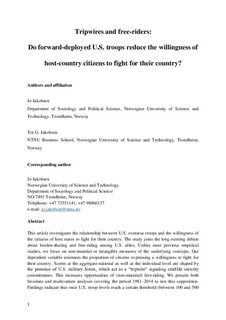Tripwires and free-riders: Do forward-deployed U.S. troops reduce the willingness of host-country citizens to fight for their country?
Journal article, Peer reviewed
Accepted version

Åpne
Permanent lenke
http://hdl.handle.net/11250/2590417Utgivelsesdato
2018Metadata
Vis full innførselSamlinger
- Institutt for sosiologi og statsvitenskap [2757]
- NTNU Handelshøyskolen [1623]
- Publikasjoner fra CRIStin - NTNU [37994]
Sammendrag
This article investigates the relationship between U.S. overseas troops and the willingness of the citizens of host states to fight for their country. The study joins the long-running debate about burden-sharing and free-riding among U.S. allies. Unlike most previous empirical studies, we focus on non-material or intangible measures of the underlying concepts. Our dependent variable estimates the proportion of citizens expressing a willingness to fight for their country. Scores at the aggregate-national as well as the individual level are shaped by the presence of U.S. military forces, which act as a “tripwire” signaling credible security commitments. This increases opportunities of (non-material) free-riding. We present both bivariate and multivariate analyses covering the period 1981–2014 to test this supposition. Findings indicate that once U.S. troop levels reach a certain threshold (between 100 and 500 troops), citizens’ willingness to fight drops significantly. This likely reflects non-material free-riding.